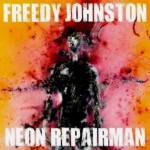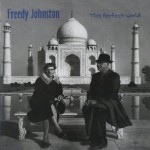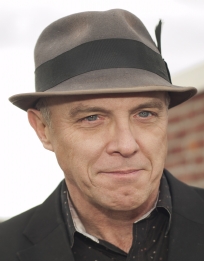In singer/songwriter Freedy Johnston’s hometown of Kinsley, Kansas, there’s a sign which says that it’s 1,561 miles to New York City and to San Francisco. In pursuit of a career in music he took the first option, eventually selling part of his family’s farmland in Kansas to finance his acclaimed second album, 1992’s Can You Fly. A couple years later he released This Perfect World, which featured the single “Bad Reputation” and resulted in him being named songwriter of the year in 1995 by Rolling Stone magazine, ahead of some guy named Kurt Cobain. Other well-regarded albums followed, most recently this year’s Neon Repairman.
This interview was for a preview article for Johnston’s 8/15/15 concert at the Lobero Theatre in Santa Barbara. It was done by email, with answers received on 8/6/15. (Dina Regine photo)
Jeff Moehlis: What can people look forward to at your upcoming concert?
Freedy Johnston: I’ll be playing with my friend Wally Ingram on drums, so the fine folks can look forward to a near-rock experience.

JM: The title track of your newest album, “Neon Repairman”, is a wonderful homage to Jimmy Webb’s “Wichita Lineman”. What inspired you to write that song? And has Jimmy Webb given you any feedback on it?
FJ: Man, he has written really timeless songs. And several of them. We did crash his backstage a couple of years ago, and I emailed him an early version of “Neon Repairman”. The rock band version. I recall that his email reply was very polite, like the Oklahoma gentleman he is. He was still using pen and paper for addresses at the time, which you gotta love.
JM: The Neon Repairman album came about through crowd funding. What are the pros and cons of that model relative to, say, your major label experience in the 1990’s?
FJ: I crowdfunded half and borrowed the same amount. Recording equipment may be ten times cheaper now, but it still costs real money to record. My label Singing Magnet owns this record, and with a small team of skilled saviors at radio, publicity, and booking, I’m going to turn it into the next record, and the next. So the one-time crowdfund truly is a kickstart.
JM: Your best-known albums are Can You Fly and This Perfect World. What are your reflections on those albums?
FJ: I try to let the listeners and the critics hash that out. I know my favorite songs of mine, or favorite recordings. Which are two different things to me. Lots changed in my life after Can You Fly. I can say that when we were making it we didn’t have an expectation of such a positive response. The label had booked a block of recording time for us, but the studio always shuttled us off into the undesirable late night hours because the studio owner was working on his own record.

JM: What was it like working with producer Butch Vig on This Perfect World?
FJ: We worked any hours we liked. Haha. And many, many of them. In Butch’s case, his fee probably came out to minimum wage because of the countless hours he put in. A lot changed again in my life after “Bad Reputation”. I’ll always be grateful to Butch for that record. We still have our Madison cover band, The Know-It-All Boyfriends. Just played his sister’s wedding in July.
JM: Your songs often explore dark subject matter. I’m guessing that you find that to be much more interesting to work with than writing a bunch of love songs?
FJ: Oh, I imagine there’s no way to keep yourself out of songs. Sometimes a song is the only way to understand something, or to get through something.
JM: In the recent documentary about the band Kansas, they talked about the challenges of cracking into the music industry coming from the “expansive nothingness” of the state of Kansas. Did you find Kansas to be a place that you couldn’t wait to get out of?
FJ: Oh, it seems like everybody has a problem with their hometown, so I’m not going to add to it. I can say that I really wanted to move to New York City from Kansas, and that I never regretted the decision.
JM: What advice would you give to an aspiring songwriter / musician?
FJ: My usual advice is, if they have it in them, to try to find another musician or songwriter to collaborate with early on, and try to stick with them. I never was able to do this myself, but I can sure see the value in it, and I wish I had found a way. The whole will be greater than the sum of the parts, as they say. You can’t buy time.
JM: What are your plans, musical or otherwise, for the near future?
FJ: I’ll be on the road on the East Coast in September with my friend Jeffrey Gaines. We’re doing our own sets, and playing some stuff together. So, I’m really looking forward to that.


Discussion
No comments for “Interview: Freedy Johnston”